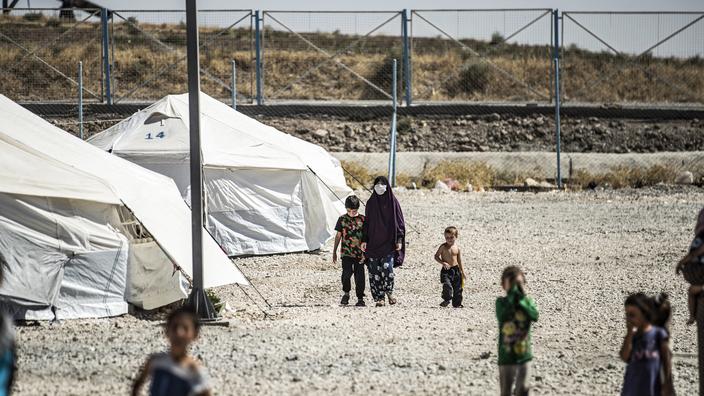“They are decided. The situation is untenable. They will go all the way, ”
says Ludovic Rivière.
While a dozen French women detained in camps in northeastern Syria have been on hunger strike for two weeks, the situation of jihadist families is getting bogged down.
Four parliamentarians who came to meet them were refused entry into Syria
"under pressure from the French authorities"
, they said on Wednesday March 3, a sign of the government's will to persist in the voice of repatriation on a "case by case" basis.
This ten French women detained in the Roj I and II camps, administered by the Kurdish authorities in Rojava, in northeastern Syria, began a hunger strike on February 21 to demand their repatriation and that of their children.
Their last messages testify to an
"extreme weakening"
, according to the lawyer Ludovic Rivière.
“
They feel dizzy
,” he continues.
Two of them are very sick.
One has serious kidney problems, the other has colon cancer. ”
To read also: "Children of jihad": "We can not predict their future or assign them a destiny"
From her home in Pas-de-Calais, Pascale Descamps, the mother of this last sick detainee, in turn engaged in a hunger strike a month ago.
“Her daughter's cancer is getting worse every day.
At 33, she risks dying in front of her 4 children, ”
says her lawyer, Emmanuel Daoud.
“The children themselves are sick because the water is not drinkable”
.
In mid-December, the UN High Commissioner for Human Rights asked France to take the necessary measures to allow it access to medical care.
All legal remedies exhausted
Despite appeals from NGOs, only children are being repatriated;
orphans or those whose mother would agree to return to France.
According to the Terrorism Analysis Center (CAT), 201 children and 80 women are currently detained in Syrian camps.
"There are currently no announcements concerning other possible repatriations"
, details Jean-Charles Brisard, president of the CAT.
“They are under the control of an unrecognized armed force.
These are people who have been tried in France, but in a situation of impunity abroad, ”
he continues.
Almost all legal remedies have been exhausted.
"
We have referred the matter to the civil judge, the administrative judge, the European Court, and we have just lodged a complaint with the Court of Justice of the Republic in January for" failure to provide assistance "to this woman whose state of health is critical, ”
explains Emmanuel Daoud, lawyer for Pascale Descamps.
Read also: In France, the delicate monitoring of "children of jihad"
The doctrine of the Élysée remains frozen despite the pressure to race against the clock.
Because parliamentarians seized on the case and mobilized in favor of repatriation.
At the end of February, a delegation of four deputies set out to meet these women in the Roj camp.
The stay of Frédérique Dumas, Mounir Satour, Hubert Julien-Lafferière and Sylvie Guillaume hardly extended beyond the border post of Fishkabour, in Iraq, where they were invited to retrace their steps.
"It is France which is pushing so that we cannot join the camp,"
accuses Frédérique Dumas on Wednesday March 3 when she got off the plane.
Lawyer Ludovic Rivière, then present, said:
“We had lunch with the Kurdish authorities who made it clear that France had left instructions.
In recent weeks, however, Danes, Belgians and Germans have returned, ”he
says.
"The government does not want parliamentarians to meet these women and alert them to their repatriation."
Asked about this during a press conference at the exit of the Council of Ministers, government spokesman Gabriel Attal pledged to provide a written response to these deputies.
A political choice?
There remains, for some of these women, the prospect of escape to benefit from the so-called Cazeneuve protocol, which involves the expulsion of all French nationals arrested on Turkish soil. To date, fourteen female jihadists are already on the run.
“This situation, from a security point of view, is very worrying. These are individuals in freedom who have not given up on their commitment, ”
adds Jean-Charles Brisard.
"By postponing decision-making, we run the risk that these women will once again join new cells of the Islamic State
.
"
“These women are the subject of an international arrest warrant. Several magistrates have confided to me their discomfort at the idea that this one will not be executed ”
, indignant Emmanuel Daoud.
"The refusal to repatriate these women despite their judicialization can only be a political choice of absolute demagoguery."
The Minister of Justice Eric Dupond-Moretti recalled in early February how the issue of repatriation remained "
dangerous
".

